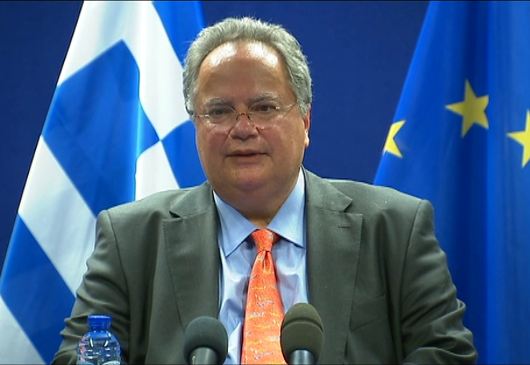 N. KOTZIAS: Good evening. Today we had a Foreign Affairs Council with a number of meetings. As you know, I met with the European Commissioner for European Neighbourhood Policy and Enlargement, Johannes Hahn. I talked with the Greek Commissioner, Dimitris Avramopoulos. In the morning we had a meeting on the Ukraine issue, a special meeting regarding Serbia. We then had a meeting on security and migration issues, and, in brief, in preparation for the June European Council, we talked about issues relating to the events in FYROM.
N. KOTZIAS: Good evening. Today we had a Foreign Affairs Council with a number of meetings. As you know, I met with the European Commissioner for European Neighbourhood Policy and Enlargement, Johannes Hahn. I talked with the Greek Commissioner, Dimitris Avramopoulos. In the morning we had a meeting on the Ukraine issue, a special meeting regarding Serbia. We then had a meeting on security and migration issues, and, in brief, in preparation for the June European Council, we talked about issues relating to the events in FYROM.
With regard to Serbia, we underscored the need to open up chapters in the accession negotiations – especially chapters 23 and 24. Chapters 32 and 35 were also discussed. The climate was that major changes have taken place in Serbia and that chapters in the negotiations must be opened. The view expressed by most sides was that Serbia can become and anchor of stability and security in the Western Balkans.
In the discussion on migration, I underscored that this is a global-scale issue. The world’s gaze is on Europe to determine the extent to which the European model still exists today, along with Europe’s ability to handle the problems of the era of globalization. Moreover, the emerging Euroscepticism in the member states is waiting to see what measures the EU is going to take with regard to illegal migration and refugees.
Our thinking is that there need to be special cooperation policies and measures, but without the militarization of the EU, and that policies need to be promoted not just for the center of the Mediterranean, the Libya-Italy axis, but for the wider region. This pressure in the center is likely to create new migration flows, while there are also corresponding flows from Afghanistan, Pakistan, Iraq and Syria. Risks of destabilization are also being observed even in large states like Egypt.
Consequently, we have the likelihood of the creation of migration flows that are 20-million strong. This number isn’t an exaggeration if one considers that some 11 to 12 million Syrians are leaving their country today. In fact, I would say that 20 million could be a conservative estimate, if we’re not careful. As a result, we need special measures on migration. We also stressed issues of search and rescue at sea, which can and must remain under the supervision of national commands. Regarding anyone else who intends to participate in the EU actions on the migration problem, there should be clear terms, conditions and stipulations for participation on which everyone agrees – including us; in certain cases, only us.
There was also a very brief discussion of FYROM and the recent incidents – inexplicable, according to some, though personally I find them perfectly understandable – that are causing concern in Europe as a whole regarding destabilization in the Western Balkans. As many have said in the past that Greece is to blame for not allowing the opening of FYROM’s accession process in 2007-2008, I underscored that we mustn’t confuse the date of the breaking of a scandal with the date at which it actually started. It has now been shown, for example, that the phone-tapping and anti-democratic measures began in FYROM in 2007.
I made two observations on this issue. The first observation is that many member states have a share of blame due to the policy they followed on FYROM, as they convinced the Skopje government that it is easy to pressure Greece into changing its policy, and consequently the Skopje government doesn’t need to adopt the European culture, which stipulates, on the one hand, that one acts based on rule of law, and, on the other, that one’s actions are governed by a culture of compromise.
When, for years, they tell the leadership in Skopje that they don’t need to compromise because pressure will be put on Greece, then FYROM foreign policy learns that compromises aren’t necessary. When Skopje is then taught that, despite Greece’s creative compromises 15 years ago, it doesn’t need to move towards compromises with the Albanian element, because the foreign player will put pressure on the Albanian parties, it is natural that the Skopje leadership will come to the conclusion that they don’t need to make compromises, even with the opposition party. Thus, the lack of a political culture of, and commitment to, the rule of law has resulted in their being spoiled by certain parties.
The second observation is that there are various cooperative configurations amongst member states of the EU in support of FYROM, in which none of the three EU member states that are also Balkan countries – Romania, Bulgaria and Greece – have participated. But this is not compatible with the rules for building the EU, with the provisions of the Treaties, or with the plan we had in the past for a Constitution of the European Union.
JOURNALIST: When will the naval operations start?
N. KOTZIAS: In the coming week the technical committees will look at this issue. I would also like to add an observation that I mentioned in the context of the Council: The technical groups should deal with the technical problems, but the Ministers of Foreign Affairs shouldn’t deal with the political issue only as a technical issue. This issue is of profound political importance for the future of Europe and Europe’s image.
May 19, 2015


